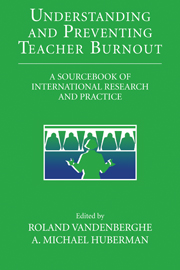Book contents
- Frontmatter
- Contents
- Contributors
- List of Figures
- List of Tables
- Foreword
- Introduction: Burnout and the Teaching Profession
- PART ONE TEACHER BURNOUT: A CRITICAL REVIEW AND SYNTHESIS
- PART TWO TEACHER BURNOUT: PERSPECTIVES AND REMEDIES
- PART THREE TEACHER BURNOUT: A RESEARCH AND INTERVENTION AGENDA
- 19 Teacher Burnout: A Research Agenda
- 20 Beyond Individual Burnout: A Perspective for Improved Schools. Guidelines for the Prevention of Burnout
- References
- Index
20 - Beyond Individual Burnout: A Perspective for Improved Schools. Guidelines for the Prevention of Burnout
Published online by Cambridge University Press: 06 January 2010
- Frontmatter
- Contents
- Contributors
- List of Figures
- List of Tables
- Foreword
- Introduction: Burnout and the Teaching Profession
- PART ONE TEACHER BURNOUT: A CRITICAL REVIEW AND SYNTHESIS
- PART TWO TEACHER BURNOUT: PERSPECTIVES AND REMEDIES
- PART THREE TEACHER BURNOUT: A RESEARCH AND INTERVENTION AGENDA
- 19 Teacher Burnout: A Research Agenda
- 20 Beyond Individual Burnout: A Perspective for Improved Schools. Guidelines for the Prevention of Burnout
- References
- Index
Summary
Teacher burnout is not only an important issue on the agendas of educational research, as shown in the previous chapter. As an empirical phenomenon, it also has more immediate, practical consequences. Elsewhere in this volume are multiple studies showing that burnout affects the quality of teachers' professional performance, their level of commitment, and their job satisfaction. It also appears to affect pupils' learning negatively and places a heavy burden on the school as workplace – for example, in collegial relations, in the quality of the school climate. Even from a financial and economic point of view, there are consequences in terms of increased costs (Rudow).
In this final chapter, we propose a set of guidelines that can help to redesign the school as a workplace so as to reduce or to minimize the risk of teacher burnout. These guidelines resulted from discussions of the papers presented at the international conference on “teacher stress and burnout”, organized by the Johann Jacobs Foundation (November 2–4, 1995) in Marbach (Germany), of which several are incorporated in this volume. As such, these guidelines constitute a school-specific complement to the research agenda proposed in the previous chapter. After providing some general assumptions in our approach, we present the guidelines at several levels of school organization and their relation to the wider sociocultural and political environment. Because the guidelines are closely connected to the perspective of teacher and school development, we address these issues in a final section.
- Type
- Chapter
- Information
- Understanding and Preventing Teacher BurnoutA Sourcebook of International Research and Practice, pp. 304 - 314Publisher: Cambridge University PressPrint publication year: 1999
- 12
- Cited by

